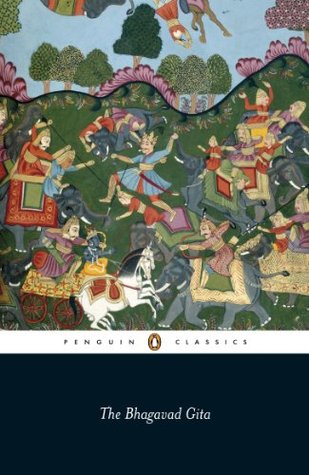More on this book
Community
Kindle Notes & Highlights
Brahman is the elemental force that inspires all things animate and inanimate in the universe. To know Brahman is to understand that one’s small self,
the term yoga derives from the verbal root yuj, ‘to yoke’ or ‘to join’, and thus, relatedly, to ‘engage intensely in something, to follow a discipline’.
In samkhya, the world is divided into purusha, the animating spirit, gendered masculine, which undergirds all things in the universe, and prakriti, the material nature of the created world, gendered feminine.
Sattva is more than just its literal meaning of truth, but rather the quality of truth to which one should aspire – filled with light, a form of honest and pure moral conduct. Some have translated sattva as ‘lucidity’. Sattva tends to be associated with the moral ideal for brahmins as teachers and priests. Rajas, on the other hand, is the quality of passion, being connected to the fruits of actions and being overjoyed or disappointed at the results of those actions.
Karma is far more complex than simply a single deed, or moment of agency. Rather, it denotes both the pattern of actions in one’s life, the ways in which one leads one’s life according to one’s station in life, and the pattern of action and consequence that keeps us in the cycle of death and rebirth.
The American transcendentalists Emerson and Thoreau found inspiration for their ideas about ‘the self’ in the Gita,
Krishna, son of Madhu, and Arjuna, son of Pandu,
Wise men mourn neither those whose life-breath is gone, nor those whose breath remains.
I have never not existed; nor have you, nor have these lords of men. Nor will we cease to exist, all of us, from now onwards. 13 Just as childhood, youth and age exist in the body of the embodied self,6 in this way, one takes on another body. Those who see clearly are not confused by this.
The limit of both being and non-being is perceived by those who see the truth.
The self is not born nor does it ever die. Once it has been, this self will never cease to be again. Unborn,8 eternal, continuing from the old, the self is not killed when the body is killed.
The self is not readily seen; by sight or mind; it is said to be formless and unchanging; so, when you have known this, you should not mourn.
Death is fixed for those who are born, and birth is fixed for those who die; since such an end is certain, you should not grieve.
Your authority is in action alone, and never in its fruits; motive should never be in the fruits of action, nor should you cling to inaction.
The person whose mind is free from anxiety about sorrows, and free from greed for pleasures, with rage, passion and fear gone, whose thoughts are firm, that one is said to be a sage.
Clinging is born to someone who dwells on the spheres of the senses; desire is born from clinging; and anger is born from desire.
The person who casts away all desires, who moves away from clinging, who has no idea of ‘mine’, and who has no idea of ‘I’, that one comes to peace.
Except for action whose end is sacrifice, this world is bound by action; without clinging, perform action towards this end of sacrifice,
The one who does not set the wheel in motion here on earth lives uselessly, wanting to hurt, impassioned by the senses,
Even the wise person struggles according to individual nature; beings follow their own nature.
Better death in one’s own dharma! The dharma of another only brings on fear.
They say that the senses are crucial; and the mind more crucial than the senses; and even more crucial than the mind is insight; and much more crucial than insight, is this [self].
Without wisdom, without placing trust, the doubting self is destroyed; there is no pleasure for the doubting self – not in this world, nor in the world beyond.
Making outside sensation truly outside, focusing the eye between the eyebrows,6 making equal the ingoing breath and the outgoing breath, moving in the nose, 28 the sage whose highest path is release, whose sense, mind and insight are controlled, whose anger, fear and longing have disappeared, is always released.
Among those who cheat, I am risk. Among the brilliant, I am brilliance. I am victory; I am resolve. Among those who possess the truth, I am truth.
The one in whose presence the world does not tremble, and who does not tremble in the presence of the world, who is free from pleasure and impatience, fear and anxiety, is also dear to me. 16 The one who is able, pure and impartial, who sits apart, whose anxiety is gone, who leaves off all endeavours, who is devoted to me, is dear to me.
When the lord5 gains a body, and when he leaves it, he goes and takes up the senses, just as the wind takes fragrances from the place where they began. 9 This lord rules taste and smell, hearing, sight and touch, as well as the mind; he enjoys the objects of the senses. 10 The confused do not perceive the lord as he leaves or stays, or partakes in the midst of the gunas, but the ones with eyes of wisdom see him.
Humans are made of trust; they grow to become whatever they trust.
All beginnings are surrounded by error, as fire is surrounded by smoke.


